by Julie Pigott Dillard | Jan 25, 2019
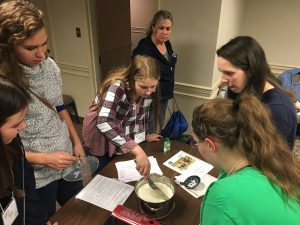
Can making mozzarella cheese really help you find your future career?
As an Extension Agent, I’ve attended numerous 4-H events through the years. Recently, I co-taught workshop at the National Youth Summit on Agri-Science at the National 4-H Center. Along with 4-H Dairy & Poultry Science Specialist, Chris Decubellis, FCS Agent, Jill Breslawski, and Dairy Regional Special Agent, Coleen Larson, we instructed 53 teens from 23 states in our two workshops!
Careers and Cheese…There’s a Connection!
Teens were introduced to agri-science during the keynote address by Mr. Ted McKinney, the Under Secretary of Agriculture for Trade and Foreign Agriculture Affairs. Summit sessions included introductions to career options and agri-science hands-on workshops. The questions and levels of interest were refreshing. I was most impressed with a young lady who expressed hesitation about attending the summit – she thought it would be solely farm-based topics. After she participated in our Exploring Dairy Science workshop (incorporating a presentation on a wide variety of careers available in the Dairy Science field and a hands-on activity making mozzarella cheese), she inquired about my career. As we discussed the vast realm of degrees one could hold to work as an Extension Agent and the wide variety of jobs available in Extension, she then shared she had found some direction for her future study in college when she entered as a college freshman in the fall of 2020.
Look Past the Title
Witnessing teens discover fields of study that meet their interests is the best reward! These type of 4-H youth opportunities help teens in so many ways. I encourage all 4-Hers to look past an event title, explore the event opportunities and keep an open mind. It could be a life changing experience!
For more information on 4-H in your county as well as state and national level events, contact your local UF/IFAS Extension office. Learn more about the Florida 4-H Dairy project.
This article was written by Marie Arick, UF/IFAS Extension Liberty County, County Extension Director & Family/Consumer Sciences Agent.
by amgranger | Dec 7, 2018
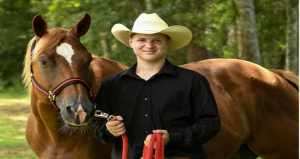
Photo Credit: Melissa Loper
Warren Loper is an award-winning member of the Boots and Buckles 4-H Horse Club. Earlier this year, the Jackson County 4-H’er won awards at both the regional and state 4-H horse shows. What makes Warren unique is that he is also hearing impaired. But Warren is very much a “people person” and doesn’t like feeling different from anyone else. His mother, Melissa Loper, recently talked to me about his 4-H experience and how it has played a role in helping Warren build confidence and achieve success regardless of his challenge.
At two weeks old, Warren was diagnosed as being completely deaf due to improper functioning hair follicles in the Cochlea. At 15 months of age, he received a Cochlear implant that was activated at 18 months of age.
Melissa said Warren didn’t like the Cochlear implant at first because it allowed for all sounds to be heard at once. He had to learn how to drown out background sounds. The implant had to be turned down completely and then slowly raised to a level that was tolerable. His ability to handle the implant increased as he got older. Melissa says there are times when Warren would rather not be able to hear.
When asked what role 4-H has played in helping Warren build confidence and feel included, Melissa shared the following:
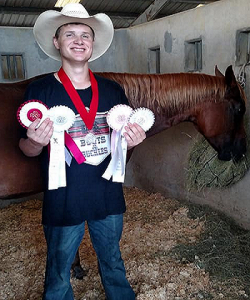
Photo Credit: Julie Hughes
“Being involved in the 4-H Horse Project has helped him so much. He has come out of his shell. His club leader, Lindsay Kiefer, has spent hours working with Warren and is so patient with him. He lives for helping other children, and it makes him feel important. One key thing is that no one on our team treats him like he is different than they are. As a mother, that is so important to me. Seeing the improvements he has made in his social skills and seeing him develop into an amazing rider warms my heart.”
One of the key components of 4-H is developing life skills and providing a safe and inclusive environment for all youth regardless of their physical or mental conditions. 4-H allows all youth the opportunity to explore their areas of interest. For Warren, the 4-H horse project allows him to learn the valuable life skills that come from raising and showing a horse and also allows him to exhibit mastery of learned riding skills in competitive events.
FUN FACTS…
Youth involved in the 4-H Horse Project learn more than just the science behind feeding and caring for a horse, and how to properly ride. Youth also compete in contests such as horse bowl, demonstrations, public speaking and art. Youth participating in this projects use their horse as a tool to increase their knowledge and enhance their life skills making them more productive young people. To find out more about the horse project in your county, contact your local UF/IFAS Extension office.
by Julie Pigott Dillard | Oct 1, 2018
2018 4-H Chick Chain
The final link in the 4-H Chick Chain project closed on Saturday as 4-H members from the northwest extension district participated in a showmanship and skill-a-thon contest and brought their best birds for judging.
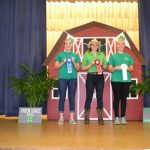
Skill-a-Thon Seniors

Skill-a-Thon Juniors
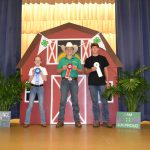
Skill-a-Thon Intermediates
Showmanship – This tests youth on how knowledgeable they are about the care, nutrition and health of their project and how they handle their bird.
Junior Showmanship – 1st Taylor Anderson,
2nd Tucker Padgett, 3rd Emma Weeks
Intermediate Showmanship – 1st Catherine Proud, 2nd David Marr, 3rd Brodie Price
Senior Showmanship – 1st Kearsten Dalton, 2nd Hailey Dalton, 3rd Brayden Price
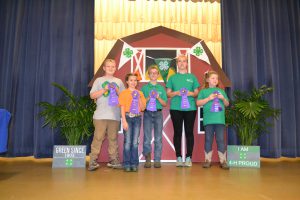
Best of Breed winners
Exhibition – How the youth fed and cared for their projects was also put to the test as the birds were judged on breed characteristics and production potential.
Best of Breed Barred Rock – JaceBryan Broxson
Best of Breed Buff Orpington – Ethan Thornburry
Best of Breed Cochin – Brooks Marr
Best of Breed Cuckoo Maran – Kearsten Dalton
Best of Breed Speckled Sussex – Emma Fore
Best of Breed White Leghorn – Bella Price
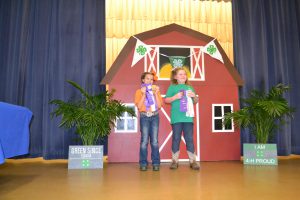
Overall Grand Champion and Reserve Champion
Grand and Reserve Champions
From the Best of Breed winners, an overall grand champion and reserve champion were named.
Overall Reserve Champion – Emma Fore
Overall Grand Champion – Bella Price
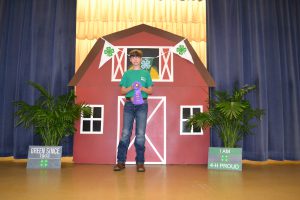
Best of Show Production Bird
Best of Show Production
Youth who have participated in the 4-H Chick Chain in 2016 and 2017 also brought their best production birds to be judged. Birds were judged on production elements.
Best of Show Production – Brayden Price
Skill-A-Thon

Skill-a-Thon Juniors

Skill-a-Thon Intermediates

Skill-a-Thon Seniors
Skill-a-thon is a hands-on way to test general knowledge of poultry including identifying breeds, setting up a brooder, reading a feed label, identifying common poultry diseases and identifying parts of the chicken.

Photography Top Senior
Photography
Our newest category youth this year included photography. We had several entries featuring the birds at all ages of the project.
Best of Show Photography Senior – Hailey Dalton
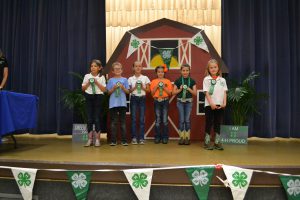
Cloverbud Exhibitors
Cloverbuds
Our Cloverbud 4-H members are an important part of our project. Even though they are non-competing, they participated in every aspect of the show, skill-a-thon and project books.
Be sure to like the 4-H in the Panhandle Facebook page to get the latest information on when registration for the 2019 4-H Chick Chain project will open. There’s also a comprehensive list of all of the award winners from this year!
Thanks for participating
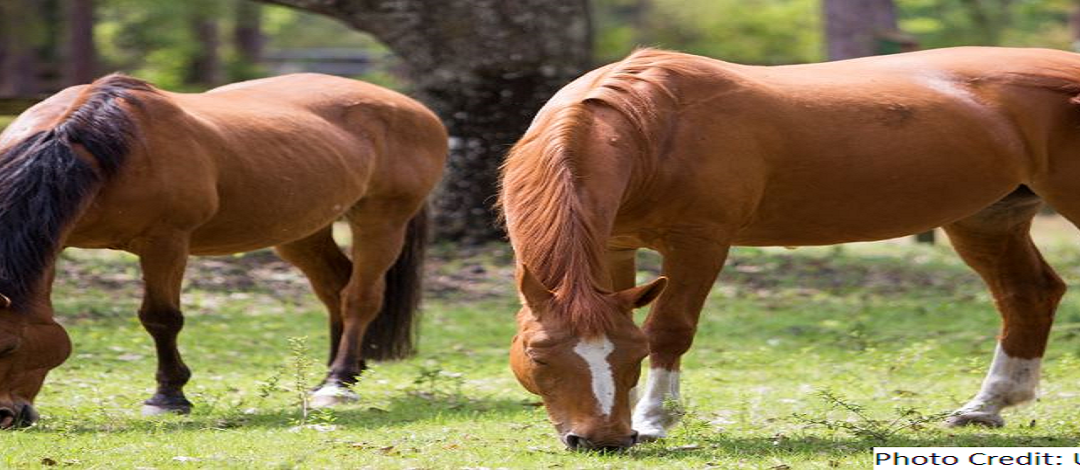
by amgranger | Sep 28, 2018
Be Prepared and Have a Plan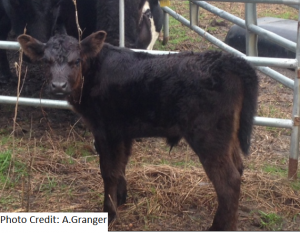
This time last year, we were helping our 4-H friends all over Florida recover from Hurricane Irma. Hurricane season has been quiet in Florida so far, but that doesn’t mean we need to let our guard down – we still have two more months of hurricane season.
So,what would you do if you didn’t have electricity? How will you care for your 4-H project animals? Do you have an evacuation plan? Answers to these questions become major issues when dealing with disasters.
Disasters can be natural/weather-related, man-made or accidental. Regardless of the type, it’s important to be prepared and have a plan for you and your animals.
Plan for Your Animal’s Safety
Whether you evacuate or shelter in place, here are a few considerations:
- Be ready to leave once the evacuation is ordered.
- Evacuate animals as soon as possible.
- Your project animal won’t be able to stay with you in a shelter like a dog or a can.
- Know where safe livestock facilities are in your area or along your evacuation route.
- If you can’t evacuate, decide if you’re keeping animals confined to a barn or turning them out into pastures.
- Barn confinement may become dangerous and take away the animal’s ability to protect themselves.
- Pastures should be at least one acre in size with no potential hazards (barbed wire, power-lines, polls or items that can be picked up by the wind).
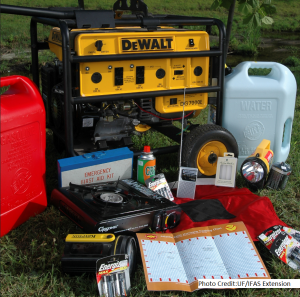 Disaster Preparedness for Livestock – Why Livestock Owners Need to Be Prepared
Disaster Preparedness for Livestock – Why Livestock Owners Need to Be Prepared
The Florida Department of Agriculture and Consumer Services (FDACS) has some suggested guidelines about preparing livestock and horses for disasters:
- Check with your local humane organization, extension office or local emergency management agency to read about your county disaster response plans.
- Determine safe evacuation routes for trailers and livestock.
- Prepare a Farm Disaster Kit and Basic First-Aid Kit. Remember, supplies during or after the disaster may be in short supply, or roadways may be blocked. Keep kits up-to-date, keep them on-site and in your vehicle.
- A vaccination and test records (Coggins, health certificates, etc.)
- A list of all animals, where they are located on the farm and feeding instructions/records
- Sanitation items, cell phone, flashlights, portable radios and batteries.
- Have feed, water, handling equipment, tools, veterinary supplies and a generator (with fuel) on hand if possible.
- Make a list of emergency numbers – veterinarian, neighbors, state veterinarian, animal shelter, county extension office,local volunteer organizations and someone outside of the disaster area.
- Make sure you have proof of animal ownership. Have temporary ID supplies on hand like permanent markers and plastic bands that are safe, durable and visible. ID should include your name, address, and telephone number.
- Poultry need access to high areas to perch if you’re in an area susceptible to flooding. Provide access to clean water and food.
- Remove barbed wire or other fencing so animals can move to areas of safety during flooding or high winds.
- Store water in large containers (enough for a week) suck as troughs, swimming pools or boats
- Secure items that might be picked up and thrown by the wind like pieces of metal, troughs, tanks or trailers.
- Ensure there is safe shelter, fencing or pens.
- Keep animals in groups they’re used to where they are securely contained and protected from the elements.
Resources:
For more information about 4-H, contact your local UF/IFAS County Extension Office. If you are an adult or teen with skills or knowledge you’d like to share, ask about becoming a 4-H volunteer!
by amgranger | Mar 29, 2018
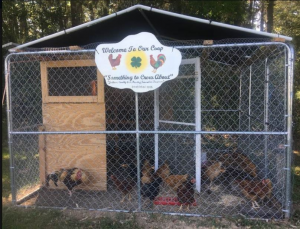
Many Extension Offices offer Cooperative Coops for youth who live in areas that are not zoned for poultry – UF/IFAS Jackson County Extension 4-H Program
Photo Credit: Angel
If you have been entertaining the idea of adding chickens to your personal “flock”, then we have some news for you! Not only would you be adding a sustainable practice at your home, your youth would have amazing opportunities to learn, develop valuable life skills and explore opportunities in 4-H. Youth from all walks of life (urban and rural) are involved in 4-H poultry projects. Here’s the scoop on getting started with backyard coops:
- Location– the first thing you need to find out is whether or not your location is zoned for poultry and whether or not there are any building restrictions. If there are no restrictions on your property, you will want to select a location that is relatively flat, has good drainage, access to electricity and water, and some natural shade if possible. If you do live in a restricted area, contact your local UF IFAS County Extension Office– many offices have cooperative coops where youth can participate in the poultry project, even if they can’t have their own backyard coop.
- Goal– Next, you need to consider what your goal is. Do you plan to produce just eggs or are you considering producing your own meat? Are you more interested in showing your chickens? How big of an operation are you planning?
- Coop Size– Are you planning to allow your birds to free-range or stay in an enclosed pen? Birds that are allowed to roam free during the day do not need as large a coop. If you are planning to keep your birds cooped up to keep them safe from neighborhood dogs or wildlife, you will need a larger coop. Also, the number of birds and breeds you want to have will impact your coop size. Here are the general rules of thumb when it comes to coop size:
- Heavy breeds– such as Australorp, Barred Rock, or Buff Orphington need 4 square feet of space if allowed out to forage during the day, but 10 square feet of space per bird if they are kept in the coop.
- Light breeds– such as Leghorn, Araucana or Silkies need 3 square feet of space per bird if allowed to forage, but 71/2 square feet of space per bird if kept in the coop.
For more information on selecting breeds, check out this article: Which Breeds are Best for Backyard Poultry.
- Coop Style– Chickens have been around for thousands of years so they are pretty resilient, but you still need to consider giving them proper shelter and protection from the elements and predators. Make sure that your coop has the capability to repel predators that fly, dig or crawl. Chickens are susceptible to birds of prey such as hawks and owls as well as predators on the ground including snakes, opossums, raccoons, coyotes, dogs and cats. There are many styles to choose from and you can spend a lot or a little, depending on your budget or your skills as a carpenter! Links to a few example coop plans are provided in the resources below. Many hardware and feed supply stores have “coop kits” for sale that are easy to put together. Generally, these coops are for small numbers of birds and are easy to remove should you change your mind about having a backyard flock later. The coop shown above was constructed with a 10 x 10 chain-link dog kennel and a canvas kennel cover. The roof and sides were laced with poultry wire which was also buried 8-10 inches in the ground around the perimeter. An enclosed area with laying boxes was constructed out of scrap lumber, an old screen door and a roll of window screen. All of the components give the birds protection from the elements and predators. Make sure that your coop site has access to electricity and water.
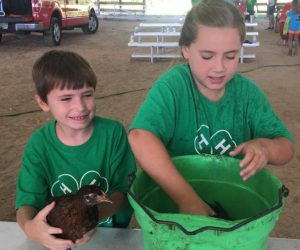
Chick Chain Participants
Photo Credit: A. Granger, UF/IFAS Jackson County Extension
If you have decided to incorporate some of the 4-H activities such as embryology or Chick Chain, you will be starting with day-old chicks that will require a little different living environment, at least until they can keep themselves warm and are big enough to be put on the ground. Regardless of the age of the birds, make sure that you are providing adequate amounts of fresh feed and clean water every day.
Once your birds are mature enough to lay eggs or be used for meat, you will enjoy having a great source of protein and a valuable teaching tool for youth. Learning skills such as record keeping and responsibility are just two of the skills that come to mind. Not to mention opportunities in learning to show or exhibit birds, learning about poultry and meats judging, earning scholarships in the 4-H Tailgate Cookery Contest and developing entrepreneurial skills in producing eggs or meat for your family or others.
There are multiple opportunities in 4-H poultry project. If you are interested in participating, either as a youth member or an adult volunteer, contact your local UF IFAS County Extension Office or visit http://florida4h.org.
Resources:
Backyard Flocks
Florida 4-H Chick Chain Project
Florida 4-H Poultry Project Page
Florida 4-H Embryology Program
4-H Poultry Judging
Life Skill Development Related to Participation in 4-H Animal Science Projects
by bestevez | Jan 11, 2018
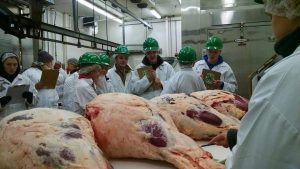
Florida 4-H members judge beef rounds at the UF/IFAS Animal Science Department meat science clinic. Photo Credit: Brian Estevez, UF IFAS Escambia County
Florida 4-H provides learning opportunities, camps, contests, shows and events in a multitude of areas for its members. The 4-H meat science project allows youth to learn about the different cuts of meat including quality factors that affect the safety and taste of the meat products we consume. The project culminates each year in April at the Florida 4-H Meat Judging Contest. The 2018 contest is April 21, 2018 at the Meat Processing Center at the University of Florida. The UF/IFAS Department of Animal Sciences also hosts a Livestock/Meat Judging Clinic on January 12-13 in Gainesville to prepare 4-H and FFA members for the contest.
What is 4-H Meat Judging?
Many Florida 4-H members are already in the production of meat products through exhibiting market steers, swine, sheep, and goats at livestock competitions. Through participation in judging contests and other leadership contests, agents, leaders, and youth learn valid, science-based information to consider when evaluating and making decisions, as well as learning proper meat storage and handling procedures. This knowledge and expertise to purchase safe, nutritious meat products gives future agricultural and food industry leaders a broader view of the livestock industry.
The 4-H Meat Judging Contest is composed of three areas, retail cut identification, carcass, wholesale, and retail placing classes, and oral reasons. 4-H members have to identify 50 retail cuts, including the species, primal, retail name, and cooking method. Youth then have to rank eight placing classes (carcass, wholesale, and retail classes). Finally youth have to give two sets of reasons on the placing classes that they have ranked.
This project area helps youth improve life skills, such as decision making, communications skills and confidence, but it also provides them a very practical skill they can use every time they visit the grocery store or butcher shop. Youth learn how to examine a cut of meat to determine which will be of the highest quality and flavor. Whether they cook for themselves or others, this useful skill will be perfected over time.
Another exciting aspect of the Florida 4-H Meat Judging Contest is the opportunity to attend National 4-H Meat Judging Contests. The first place senior team earns a trip to Kansas State University to participate in the National 4-H Meat Judging Contest as part of the American Royal Livestock Show in Kansas City. The second place senior team earns a trip to Denver to participate in the National Western Roundup Meat Judging Contest as part of the Western National Livestock Show.
In addition to the meat judging contest, Florida 4-H offers the Hog and Ham program and the Florida 4-H Tailgate Contest:
The Florida 4-H Hog and Ham Program is a statewide 4-H program which takes the participant through the total process of pork production from beginning to end. Youth select a feeder pig and grow it to harvesting weight, all the while keeping records on feed amounts and costs, health care, expenses, weights, etc. Youth harvest the hog and process it into wholesale or retail cuts. The project concludes by participating in a retail comparison project, completing a record book, and presenting a demonstration or illustrated talk to the other participants.
The Florida 4-H Tailgate Contest was created to further enhance the 4-H meat project by allowing youth to demonstrate their food and fire safety, meat selection, and outdoor cooking skills. Youth grill one of four proteins: beef, pork, poultry (half chicken or whole turkey breast), or shrimp. Youth are judged on their food and fire safety and meat palatability. Four regional contests throughout Florida are held between April and July, with a state contest held in the fall. Over $18,000 in scholarships were provided for winners in 2017.
The Florida 4-H meat judging contest is a fun event that can enhance your knowledge of the agricultural and food industries. The Florida 4-H Meat Judging Contest, in conjunction with the Florida 4-H Hog and Ham Program and the Florida 4-H Tailgate Contest, provides a well-rounded animal science education to all Florida 4-H members!
For more information about getting started (either as a youth member or as a volunteer), contact your local UF IFAS County Extension Office.

















